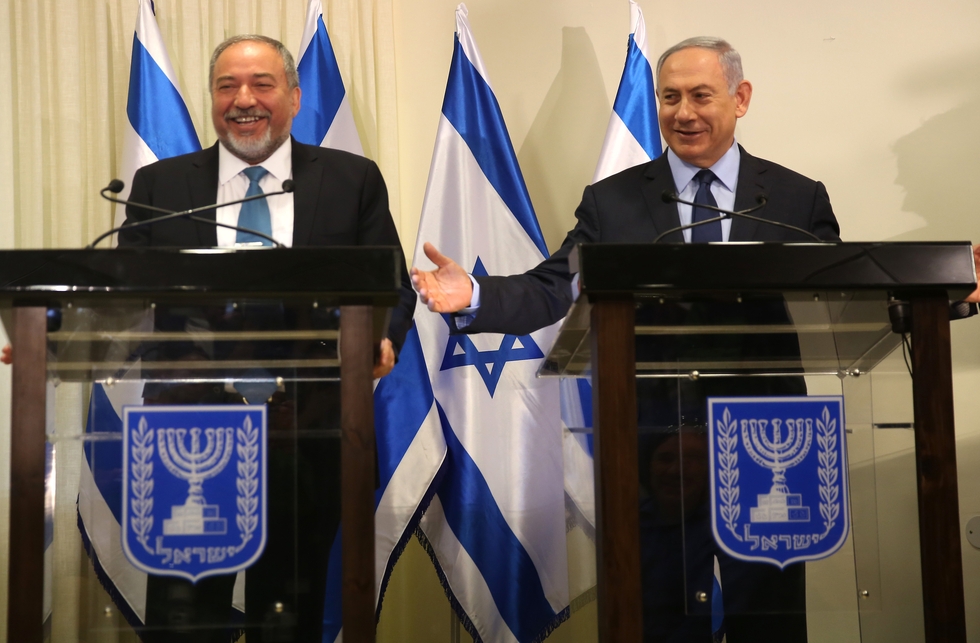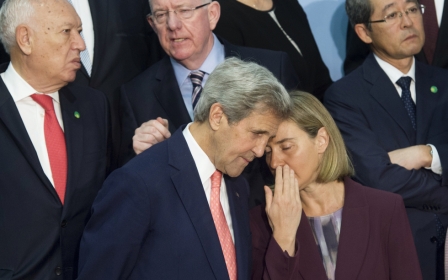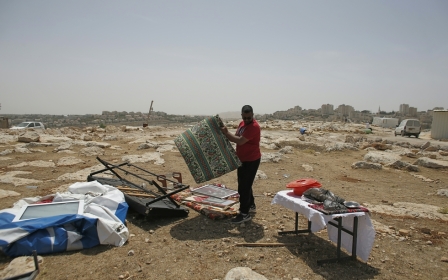Israel again makes a mockery of the Arab peace plan

Last week’s statement by Israeli Prime Minister Benjamin Netanyahu regarding the Arab peace plan is not the endorsement that the media is reporting it to be. The plan, endorsed by the Arab League in 2002 and again in 2007, “includes positive elements that can help revive constructive negotiations with the Palestinians,” he said, adding: “We are willing to negotiate with the Arab states revisions to that initiative.”
Not only does he want revisions, but he has misunderstood the entire premise of the plan. It is meant to be an overall solution to the Israeli-Arab conflict – a “final settlement,” as Saudi Foreign Minister Adel Jubeir put it last week – not simply a step to negotiations with the Palestinians.
The initiative promises peace and “normal relations” with the entire Arab world in return for a “complete withdrawal” from the Arab territories occupied by Israel in 1967, a “just solution to the problem of Palestinian refugees,” and the establishment of “an independent and sovereign Palestinian state... with East Jerusalem as its capital.”
It merely calls on Israel to abide by international law and UN resolutions - which it should be doing anyway - and was watered down in 2013 to accept mutually agreed land swaps. As such, the initiative is eminently fair, and Jubeir is right to reject Netantyahu’s request to revise it.
The prime minister has not elaborated on the revisions he seeks. This is no accident, because he knows that to do so would reveal to the world that he rejects the basic tenets of the plan. This is obvious when one looks at his policies. As such, any revisions he seeks would be intended to render it utterly meaningless.
Netanyahu and his government – indeed every Israeli government – are totally opposed to a “complete withdrawal” from the occupied Arab territories. They have made no secret of that, neither in their statements nor in their rampant and illegal colonisation of those lands. Regarding Syria’s Golan Heights, which the plan specifically refers to, Netanyahu said in April that the territory “will remain forever” in Israeli hands.
Regarding the Palestinian territories, he insists that Israel’s ever-expanding settlement enterprise - which controls around half of the West Bank (including its water aquifers and most fertile land), and has made a Swiss cheese out of it - must be largely maintained.
Furthermore, Israel wants to keep illegally annexed East Jerusalem - whose boundaries have been expanded to comprise some 10 percent of the West Bank - as well as the Jordan Valley, which comprises about another 30 percent. Whatever is left for a Palestinian state must be demilitarised, in other words defenceless. All these conditions are the antithesis of “an independent and sovereign Palestinian state.”
But then Netanyahu’s government is replete with members who reject outright the creation of a Palestinian state. In the run-up to his re-election last year, he himself vowed that it would not happen under his watch. In addition, the plan’s call for a “just solution” to the Palestinian refugee problem will never be met by a country that denies the fundamental rights of those refugees, and its responsibility for their dispossession.
Netanyahu has previously rejected the initiative, as has his new Defence Minister Avigdor Lieberman, who in 2009 described it as “a dangerous proposal, a recipe for the destruction of Israel.” However, the prime minister expressed his supposed interest in the plan at Lieberman’s swearing in last week, and the defence minister concurred with Netanyahu’s sentiments.
Given that the initiative has been gathering dust for the last 14 years, the change in tune is purely cosmetic, and is down to timing and circumstances. Both Netanyahu and Lieberman are trying to show a friendlier face to the international community, as a means of deflecting concerns over the return to government of an unabashed ultranationalist.
Netanyahu would like the world to forget that, among other things, Lieberman has called for the execution of Palestinian members of Israel’s parliament, the drowning of Palestinian prisoners in the Dead Sea “since that’s the lowest point in the world,” and the bombing of Egypt’s Aswan Dam. Lieberman has also made comments widely interpreted as advocating a nuclear attack on the Gaza Strip, and the beheading of Palestinian citizens of Israel.
With regard to the US, Netanyahu’s ploy seems to have worked. The State Department, which had said his choice of defence minister raised “legitimate questions” about the direction of Israeli policy, “welcomed” their comments on the initiative.
Netanyahu’s intention may also have been to undermine the French-organised meeting of foreign ministers from 25 countries that took place in Paris on Friday, whose aim was to revive prospects for Israeli-Palestinian peace.
He had rejected French efforts weeks before the meeting took place, citing a preference for direct talks with the Palestinians – yet another diversionary tactic to stall any just solution to the conflict, which has been a consistent hallmark of Israeli policy.
Netanyahu is not the first Israeli politician to use the Arab peace plan as a strategic decoy, and he will not be the last. Raising the prospect of peace, no matter how qualified or illusory, has become a means to indefinitely delay it.
- Sharif Nashashibi is an award-winning journalist and analyst on Arab affairs. He is a regular contributor to Al Arabiya News, Al Jazeera English, The National, and The Middle East magazine. In 2008, he received an award from the International Media Council "for both facilitating and producing consistently balanced reporting" on the Middle East.
The views expressed in this article belong to the author and do not necessarily reflect the editorial policy of Middle East Eye.
Photo: Israeli Prime Minister Benjamin Netanyahu (R) and Avigdor Lieberman (L), the head of hardline nationalist party Yisrael Beitenu, are seen during a ceremony in which they signed a coalition agreement on 25 May, 2016 at the Knesset, the Israeli parliament in Jerusalem (AFP).
New MEE newsletter: Jerusalem Dispatch
Sign up to get the latest insights and analysis on Israel-Palestine, alongside Turkey Unpacked and other MEE newsletters
Middle East Eye delivers independent and unrivalled coverage and analysis of the Middle East, North Africa and beyond. To learn more about republishing this content and the associated fees, please fill out this form. More about MEE can be found here.





